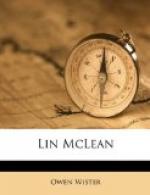“Is she with him?” he asked Barker, and musingly listened while Barker told him. The Governor had thought to make it a racy story, with the moral that the joke was now on Lusk; but that inner man had spoken and revealed the cow-puncher to him in a new and complicated light; hence he quieted the proposed lively cadence and vocabulary of his anecdote about the house of Lusk, but instead of narrating how Mrs. beat Mr. on Mondays, Wednesdays, and Fridays, and Mr. took his turn the odd days, thus getting one ahead of his lady, while the kid Lusk had outlined his opinion of the family by recently skipping to parts unknown, Barker detailed these incidents more gravely, adding that Laramie believed Mrs. Lusk addicted to opium.
“I don’t guess I’ll leave my card on ’em,” said McLean, grimly, “if I strike Laramie.”
“You don’t mind my saying I think you’re well out of that scrape?” Barker ventured.
“Shucks, no! That’s all right, Doc. Only—yu’ see now. A man gets tired pretending—onced in a while.”
Time had gone while they were in talk, and it was now half after one and Mr. McLean late for that long-plotted first square meal. So the friends shook hands, wishing each other Merry Christmas, and the cow-puncher hastened toward his chosen companions through the stirring cheerfulness of the season. His play-hour had made a dull beginning among the toys. He had come upon people engaged in a pleasant game, and waited, shy and well disposed, for some bidding to join, but they had gone on playing with each other and left him out. And now he went along in a sort of hurry to escape from that loneliness where his human promptings had been lodged with him useless. Here was Cheyenne, full of holiday for sale, and he with his pockets




